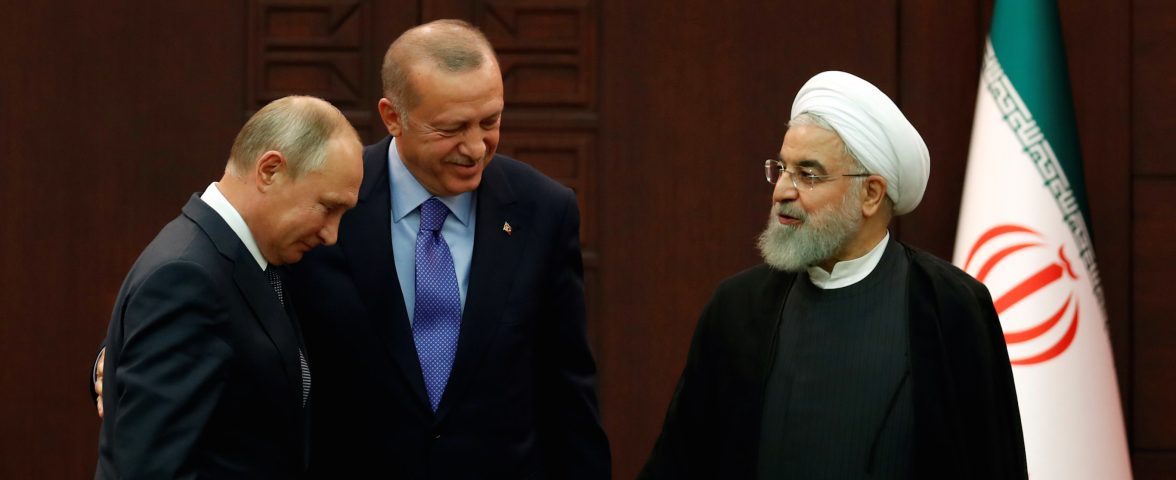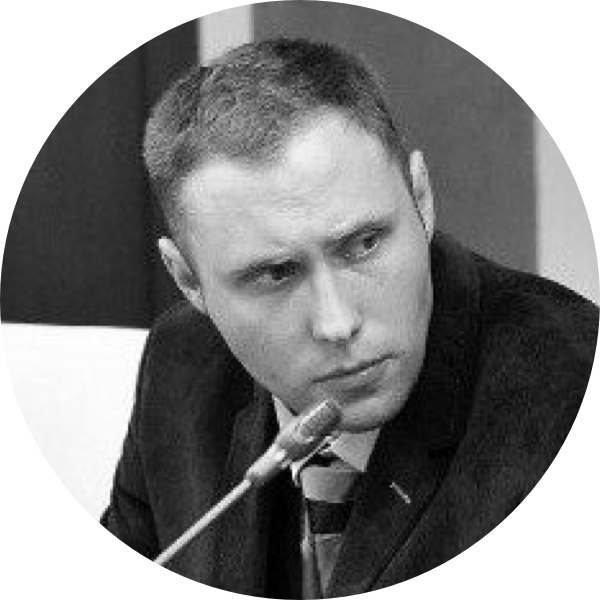MOSCOW — The fifth trilateral meeting today between the leaders of the guarantor states of the Astana process on the settlement in Syria could have been just another routine gathering of three of “today’s friends — centuries-old adversaries” if it were not for the complications that have emerged since the previous such meeting in Sochi on Feb. 14.
The smoldering tensions between Russia and Iran that overshadowed that encounter now have given full way to the Moscow-Ankara rift over Idlib. Putin was unwilling to come unprotected from all sides, so a day before he landed in Ankara the Russian Defense Ministry announced that Moscow had completed the second stage of S-400 deliveries to Turkey as a sign of being serious about its commitments to the agreements with Ankara. Meanwhile, Russia’s feelings about Turkey’s implementation of its own commitments remain sour.
“We are managing the cease-fire in the province, but that does not mean we have to accept the presence of terrorist groups in Idlib. This is why I suggest examining practical steps that Russia, Turkey and Iran might take together to eradicate the terrorist stronghold completely,” Putin said seven months ago.
Now the tone has changed, and so has the Russian military strategy on returning Idlib to Syrian government control. Prior to the trilateral meeting, Putin had separate talks with both Erdogan and Rouhani in the company of their ministers and advisers. The talks between the Russian and the Turkish delegation were scheduled to last for an hour but continued for over two hours and both presidents looked exhausted and visibly irritated when they finally came out of the meeting room.
“The deescalation zone cannot just be a terrorist harbor, let alone a foothold for armed provocations,” Putin said in his opening remarks.
“We need to take additional measures to completely eliminate the security threats coming from the Idlib deescalation zone,” he added in the most concise speech of the three leaders.
Rouhani echoed the sentiment, poking at Erdogan’s Syria skeleton in the closet. “After almost nine years of the crisis in Syria and given the experience we accumulated, we still believe that regime change [in Damascus] that some countries initially sought failed. The Syrian crisis and similar crises across the region should be settled diplomatically and by the Syrians themselves. The fight with the Islamic State and other terrorist groups should be continued until their total annihilation. Civilian casualties should of course be avoided, but one cannot allow the terrorist cowardly use of civilians as human shields,” Rouhani said.
It’s not clear as of now whether the additional hour that Putin and Erdogan had was the extra mile Moscow and Ankara decided to go to have Idlib settled, but the 14-point final communique that the three presidents signed following the talks features some important issues that show the direction where the matter may be going.
Namely, in the absence of a better deal, Moscow and Ankara agreed to maintain the Sochi memorandum on Idlib of Sept. 17, 2018, as the conceptual framework for further bilateral dealings over the troubled area. Russia and Turkey also agreed to perfect their operational coordination to address respective mutual security concerns. In practice, this means the Russia-backed Syrian government offensive on Hayat Tahrir al-Sham and other groups Damascus categorizes as “terrorist” is likely to continue but Ankara expects Moscow to ensure that Turkey’s assets — military posts and loyal opposition groups — are not attacked again. Since all of this is easier said than done, the bumpy road ahead for the two will continue — hence the increased coordination to avoid collisions and provide timely crisis management. The statement on the need for “concrete measures” to protect civilians could mean the creation of another improvised “sanitary zone,” perhaps in a Syrian-government controlled area along the Turkish border.
Putin had another issue he wanted enshrined in the communique and apparently enjoyed Rouhani’s support for it.
“The situation in the northeast of Syria — is worrisome. Here, like everywhere else, every matter should be settled based on principles of sovereignty and territorial integrity. We are coming to the belief that it is unacceptable to divide Syria into spheres of influence,” he said during the trilateral meeting. This came as a departure of sorts from his earlier position on the US-Turkish “safe zone.”
Earlier, Al-Monitor’s Amberin Zaman reported that the Russian president recognized the zone as a way to alleviate Turkey’s refugee burden. Now it seems that Moscow has discerned a potentially more menacing trend in this initiative.
Rouhani signaled Iran’s concern over the stalemate in the combat areas, saying there was an urgent need “to have Syrians define their own future without foreign interference or pressure.”
The Iranian leader expressed Tehran’s support for the Adana agreement, a proposal Putin has been promoting for a while as a way to reconcile Turkey and Syria.
“The Adana agreement may be a good template to use to lift mutual [security] concerns and [bring about the] beginning of end of bitter era [between Syria and Turkey],” Rouhani said.
Iran has also managed to get Russia and Turkey to condemn Israeli military strikes in Syria (paragraph 3) as “destabilizing, violating Syrian sovereignty and territorial integrity and leading to escalation in violence across the region.”
The makeup of the constitutional committee that was initially deemed to be the core issue of this meeting didn’t seem to receive the expected attention. In a way, this is a good sign in that it shows that the body has finally been put together and the procedures have been negotiated into an agreement. Russia, Iran and Turkey mentioned this in paragraph 8 of the communique.
The next move, as the Astana trio put it, is the launch of the committee in Geneva under the auspices of the UN Syria envoy, Geir Pedersen.
Another striking feature of the summit in Ankara was that both Putin and Rouhani didn’t shy away from taking advantage of the gathering to project their foreign policy strategies beyond the ongoing crisis in Syria. Rouhani, perhaps, did so in a subtler way, when, turning to Erdogan, he noted the need for Turkey and Iran to think about the long-term implications of their current forced partnership.
“Expansion of cooperation between the three [Russia, Turkey and Iran] is a key guarantee for the settlement in Syria and [the resolution of] other regional crises. The aliens will leave the region sooner or later, but we’ll continue to be neighbors,” he said. Some in Moscow interpreted this as a reference to both the Americans and the Russians.
Putin, asked about the Russian stance vis-a-vis the attacks over the weekend on Saudi oil facilities, said, “We are prepared to help Saudi Arabia defend their country. Political leadership [in Riyadh] only has to take a wise state decision, as did Iran by purchasing our S-300s and President Erdogan of Turkey by acquiring the S-400 missile system. The systems will defend any Saudi facilities,” Putin said with a smirk; the audience of Iranian and Turkish diplomats and the military nearly burst into laughter.
Original publication al-monitor.com












